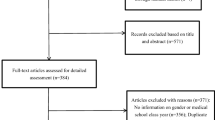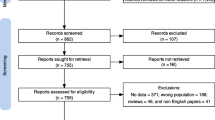Abstract
Sleep quality of medical students has generated conflicting results in China. The aim of this study was to evaluate the sleep quality of medical students in China by meta-analysis. Electronic databases were searched for studies concerning the sleep quality of medical students using the Pittsburgh sleep quality index (PSQI) published before March 6, 2017. Pooled weighted mean difference (WMD) and 95% confidence interval (95% CI) were estimated with fixed or random effect models depending on the heterogeneity. Subgroup analyses, sensitivity analyses and publication bias were also performed. Eleven studies (7154 medical students and 9073 non-medical students) were included in this meta-analysis. The sleep quality of medical students was significantly higher in scores of subjective sleep quality (WMD, 0.137; 95% CI 0.049–0.224; P = 0.002), sleep duration (WMD, 0.147; 95% CI 0.069–0.225; P < 0.001), daytime dysfunction (WMD, 0.194; 95% CI 0.077–0.311; P = 0.001) and the total scores (WMD, 0.524; 95% CI 0.152–0.896; P = 0.006). On the contrary, there was no significant difference in sleep latency, habitual sleep efficiency, sleep disturbance and use of sleeping medications. This meta-analysis indicates that the sleep quality of medical students is worse than non-medical students in China. Further large and well-designed studies are needed to confirm these findings.









Similar content being viewed by others
References
Ohayon MM, Carskadon MA, Guilleminault C, et al. Meta-analysis of quantitative sleep parameters from childhood to old age in healthy individuals: developing normative sleep values across the human lifespan. Sleep. 2004;27:1255–73.
Prehn-Kristensen A, Munz M, Molzow I, et al. Sleep promotes consolidation of emotional memory in healthy children but not in children with attention-deficit hyperactivity disorder. PLoS One. 2013;8:e65098.
Assaad S, Costanian C, Haddad G, et al. Sleep patterns and disorders among university students in Lebanon. J Res Health Sci. 2014;14:198–204.
Tononi G, Cirelli C. Sleep and the price of plasticity: from synaptic and cellular homeostasis to memory consolidation and integration. Neuron. 2014;81:12–34.
Curcio G, Tempesta D, Scarlata S, et al. Validity of the Italian version of the Pittsburgh sleep quality index (PSQI). Neurol Sci. 2013;34:511–9.
Asghari A, Farhadi M, Kamrava SK, et al. Subjective sleep quality in urban population. Arch Iran Med. 2012;15:95–8.
Melese B, Bayu B, Wondwossen F, et al. Prevalence of mental distress and associated factors among Hawassa University medical students, Southern Ethiopia: a cross-sectional study. BMC Res Notes. 2016;9:485.
Doulougeri K, Panagopoulou E, Montgomery A. (How) do medical students regulate their emotions? BMC Med Educ. 2016;16:312.
Rotenstein LS, Ramos MA, Torre M, et al. Prevalence of depression, depressive symptoms, and suicidal ideation among medical students: a systematic review and meta-analysis. JAMA. 2016;316:2214–36.
Earley LW, Johnson DG. Medical student health. J Med Educ. 1969;44:35–45.
Dyrbye LN, Shanafelt TD. Medical student distress: a call to action. Acad Med. 2011;86:801–3.
Surani AA, Zahid S, Surani A, et al. Sleep quality among medical students of Karachi. Pak J Pak Med Assoc. 2015;65:380–2.
Alsaggaf MA, Wali SO, Merdad RA, et al. Sleep quantity, quality, and insomnia symptoms of medical students during clinical years. Relationship with stress and academic performance. Saudi Med J. 2016;37:173–82.
Sahraian A, Javadopur A. Sleep disruption and its correlation to psychological distress among medical students. Shiraz E Med J. 2010;11:12–7.
Yin J. Comparison of academic degree and schooling length of clinical medicine between China and foreign countries [In Chinese]. China Med Educ Technol. 2016;30:502–7.
Lu GN. A comparative study based on Chinese and foreign higher medical education system [In Chinese]. Asia-Pac Educ. 2015:120.
Huang ZJ, Wu YX. Medical educational model in foreign countries and schooling system reform of medical education in China [In Chinese]. Northwest Med Educ. 2007;15:573–5.
Luo BC, Shi W, Li Y, et al. Excellent doctor education and the re-orientation of the development of Chinese medical education [In Chinese]. Med Philos (A). 2016;37:74–8.
Cai Y. In the context of new medical reform policy, the employment situation of medical students and a survey of strategies. [In Chinese]. Hum Resour Dev. 2016:138–139.
Krystal AD, Edinger JD. Measuring sleep quality. Sleep Med. 2008;9:S10–7.
Buysse DJ, Reynolds CF, Monk TH, et al. The Pittsburgh sleep quality index: a new instrument for psychiatric practice and research. Psychiatry Res. 1989;28:193–213.
Shim J, Kang SW. Behavioral factors related to sleep quality and duration in adults. J Lifestyle Med. 2017;7:18–26.
Bertolazi AN, Fagondes SC, Hoff LS, et al. Validation of the Brazilian Portuguese version of the Pittsburgh sleep quality index. Sleep Med. 2011;12:70–5.
Doi Y, Minora M, Uchiyama M, et al. Psychometric assessment of subjective sleep quality using the Japanese version of the Pittsburgh sleep quality index (PSQI-J) in psychiatric disordered and control subjects. Psychiatry Res. 2000;97:165–72.
Liu XC, Tang MQ, Hu L, et al. Reliability and validity of the Pittsburgh sleep quality index [In Chinese]. Chin J Psychiatry. 1996;29:103–7.
Rostom A, Dubé C, Cranney A, et al. Celiac Disease. Evidence Report/Technology Assessment No. 104. Agency for Healthcare Research and Quality (US). 2004. http://www.ncbi.nlm.nih.gov/books/NBK35156/. Accessed Sept 2004.
Higgins JP, Thompson SG. Quantifying heterogeneity in a meta-analysis. Stat Med. 2002;21:1539–58.
Mantel N, Haenszel W. Statistical aspects of the analysis of data from retrospective studies of disease. J Natl Cancer Inst. 1959;22:719–48.
Der Simonian R, Laird N. Meta-analysis in clinical trials. Control Clin Trial. 1986;7:177–88.
Begg CB, Mazumdar M. Operating characteristics of a rank correlation test for publication bias. Biometrics. 1994;50:1088–101.
Egger M, Davey Smith G, Schneider M, et al. Bias in meta-analysis detected by a simple, graphical test. BMJ. 1997;315:629–34.
Yao XD, Shen ZF, Xiang HQ, et al. Investigation and analysis of medical students sleep quality [In Chinese]. J Jiaxing Univ. 2006;18:126–8.
Gao L, Sun HY, Jia F. Comparative analysis on sleep quality between medical and normal university students [In Chinese]. Chin J School Doctor. 2007;21:417–8.
Wei CQ. Comparative analysis on sleep quality between medical and engineering university students [In Chinese]. Chin J Sch Health. 2009;30:1027–8.
Zheng TS, Zheng YY, Mao GY, et al. The investigation of sleep quality and cognitive on college students [In Chinese]. Med Soc. 2010;23:84–6.
Chen YJ. Research on the relationship among anger, presleep through control and sleep quality of college students. [In Chinese] Master thesis, Fujian Normal University, 2011.
Zhang JS. Investigation on sleeping quality of university students and its influential factors. [In Chinese] Master thesis, Wuhan University of Science and Technology, 2012.
Huang L, Zhu K, Sun C, et al. Comparative analysis on sleep quality and its influencing factors between medical and non-medical undergraduate students [In Chinese]. Fudan Univ J Med Sci. 2013;40:303–8.
Luo JY, Huang JM, Wei JS, et al. Investigation on sleep quality and sleepiness of students in guangzhou college [In Chinese]. China Mod Med. 2014;21:168–74.
Zhang LL. The relationship between cyber bullying and sleep disorder among the students of three high vocational colleges in Anhui province. [In Chinese] Master thesis, Anhui Medical University, 2014.
Ding J. Relationship among sleep beliefs and attitude, sleep effort, perfectionism and sleep quality in college students. [In Chinese] Master thesis, Zhengzhou University, 2015.
Zheng YN, Hu W, Wen YY, et al. Quality of sleep and influencing factors among freshmen in Ganzhou [In Chinese]. Chin J Sch Health. 2017;38:57–9.
Shah M, Hasan S, Malik S, et al. Perceived stress, sources and severity of stress among medical undergraduates in a Pakistani medical school. BMC Med Educ. 2010;10:2.
Purim KS, Guimarães AT, Titski AC, et al. Sleep deprivation and drowsiness of medical residents and medical students. Rev Col Bras Cir. 2016;43:438–44.
Preišegolavičiūtė E, Leskauskas D, Adomaitienė V. Associations of quality of sleep with lifestyle factors and profile of studies among Lithuanian students. Medicina (Kaunas). 2010;46:482–9.
Giri P, Baviskar M, Phalke D. Study of sleep habits and sleep problems among medical students of pravara institute of medical sciences loni, Western maharashtra, India. Ann Med Health Sci Res. 2013;3:51–4.
Bruck D, Astbury J. Population study on the predictors of sleeping difficulties in young Australian women. Behav Sleep Med. 2012;10:84–95.
Zhang B, Wing YK. Sex differences in insomnia: a meta-analysis. Sleep. 2006;29:85–93.
Dyrbye LN, Thomas MR, Shanafelt TD. Medical student distress: causes, consequences, and proposed solutions. Mayo Clin Proc. 2005;80:1613–22.
Shad R, Thawani R, Goel A. Burnout and sleep quality: a cross-sectional questionnaire-based study of medical and non-medical students in India. Cureus. 2015;7:e361.
Mazurkiewicz R, Korenstein D, Fallar R, et al. The prevalence and correlations of medical student burnout in the pre-clinical years: a cross-sectional study. Psychol Health Med. 2012;17:188–95.
Waqas A, Khan S, Sharif W, et al. Association of academic stress with sleeping difficulties in medical students of a Pakistani medical school: a cross sectional survey. Peer J. 2015;3:e840.
Ahrberg K, Dresler M, Niedermaier S, et al. The interaction between sleep quality and academic performance. J Psychiatr Res. 2012;46:1618–22.
Author information
Authors and Affiliations
Corresponding author
Ethics declarations
Funding
This research received no grant from any funding agency in the public, commercial, or not-for-profit sectors.
Conflict of interest
The authors declare no conflict of interests.
Ethical approval
This article does not contain any studies with human participants or animals performed by any of the authors.
Electronic supplementary material
Below is the link to the electronic supplementary material.
41105_2017_118_MOESM1_ESM.tif
Fig. S1 Sensitivity analysis of subjective sleep quality between medical students and non-medical students (TIFF 6549 kb)
41105_2017_118_MOESM4_ESM.tif
Fig. S4 Sensitivity analysis of habitual sleep efficiency between medical students and non-medical students (TIFF 6549 kb)
41105_2017_118_MOESM6_ESM.tif
Fig. S6 Sensitivity analysis of use of sleeping medications between medical students and non-medical students (TIFF 6549 kb)
41105_2017_118_MOESM8_ESM.tif
Fig. S8 Sensitivity analysis of the total scores of PSQI between medical students and non-medical students (TIFF 6549 kb)
Rights and permissions
About this article
Cite this article
Yu, D., Ren, Q., Dong, B. et al. The sleep quality of medical students in China: a meta-analysis. Sleep Biol. Rhythms 15, 299–310 (2017). https://doi.org/10.1007/s41105-017-0118-6
Received:
Accepted:
Published:
Issue Date:
DOI: https://doi.org/10.1007/s41105-017-0118-6




